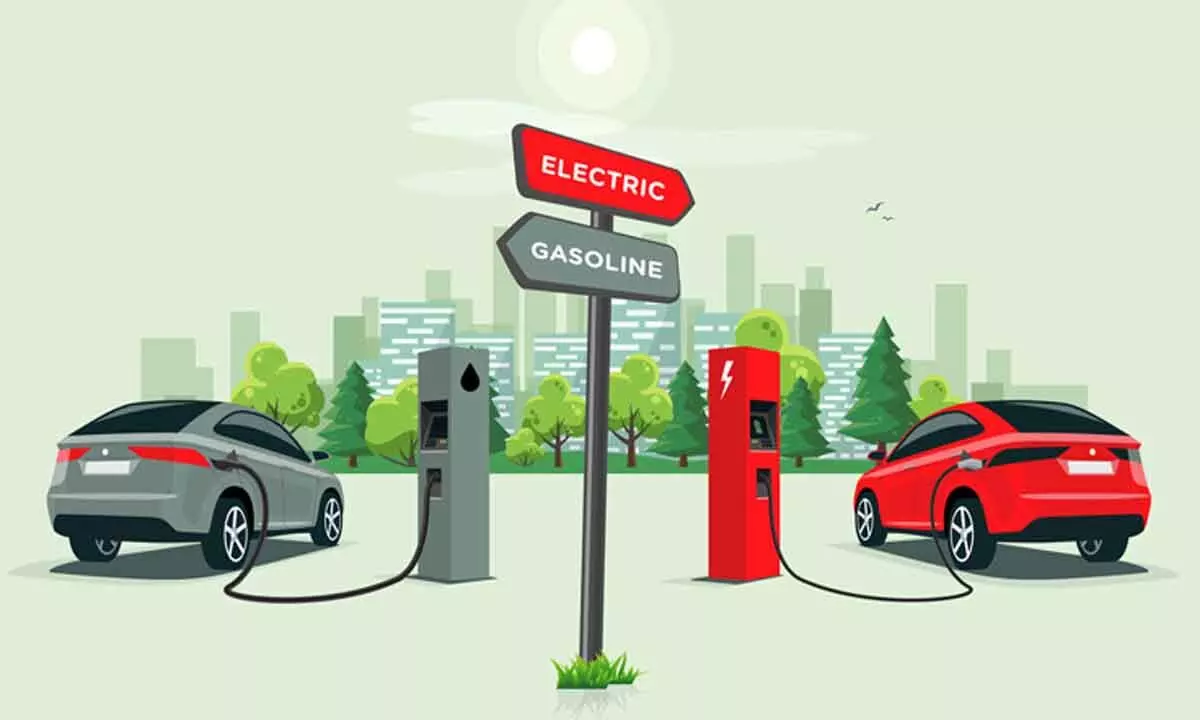Electric vehicles set for an overdrive in 2024
The number of electric vehicles on Indian roads is likely to touch 3.9 million
image for illustrative purpose

The EV financing market will witness a paradigm shift, marked by competitive interest rates, flexible financing options and strategic partnerships. Financial institutions and automotive lenders may respond by offering more tailored and competitive financing options for electric vehicles
EV OEMs will in 2024 strategically adapt to a future with reduced government subsidies, prompting the introduction of both streamlined, entry-level EV models and high-end variants that will have advanced features.
The electric motorcycle segment is expected to witness a surge, intensifying competition in the 2W EV space, with established internal combustion engine manufacturers making forays into the electric market.
Talking to Bizz Buzz, Sumeru Shah, Business Head (EV two-wheeler), Ecofy says, “Indian-manufactured cells are expected to be launched in 2024, this development will help reduce the cost of batteries, creating opportunities for unit profitability and, subsequently, price reductions for consumers.”
Financing for EV 2Ws is set to go beyond traditional boundaries, moving past mere financial assistance to provide overall life cycle management.
According to Shah, “We at Ecofy, India’s green-only NBFC provide end-to-end financing solutions covering the vehicle cost, Insurance, Assured Buybacks, and AMC services through strategic partnerships with OEMs and other service providers.” A key trend this year was the dependence on government policies like FAME. The subsidies directly impacted sales across categories, which, I turn, nudged OEMs to plan for a subsidy-independent future, leading to the launch of more affordable entry-level electric vehicles.
The outlook for the EV 2W & 3W industry looks promising as issues like range anxiety, charging infrastructure and charging time have been duly addressed. The entry of major players from the ICE segment is expected to further drive adoption. With reduced subsidy dependence, certain vehicle variants may be priced higher, highlighting the crucial role of financing institutions to ensure consumer affordability. Green NBFCs like Ecofy are likely to dominate this space, sidelining traditional banks and generic NBFCs.
In 2023, the electric vehicle market in India experienced remarkable growth, with a staggering 1,02,0141 EVs registered in June alone. The industry's momentum is fuelled by a shift towards sustainability, encompassing not only personal vehicles but also heavy-duty segments. Projections indicate a robust compound annual growth rate (CAGR) of 49 per cent in the domestic EV market between 2022 and 20303.
Rohan Shravan, founder and CEO of Tresa Motors says, “In this transformative landscape, Tresa stands at the forefront, exemplified by the robust expansion of our electric trucks. Notably, advancements in battery technology, such as Tresa's Meg50 battery packs, prioritize safety and performance, enabling faster charging and extended range, further amplifying the market's appeal.”
He added that the number of electric vehicles on Indian roads is expected to surge to 3.9 million. Their trucks, equipped with innovative features like 3D sensing, route mapping, predictive acceleration, and night vision, redefine safety and efficiency.
By 2024, the EV sector is expected to witness key trends. First, advancements in battery technology will likely result in increased energy density, longer ranges and faster charging times and a broader adoption of solid-state batteries.
The integration of smart and connected features is another anticipated trend. Charging infrastructure is expected to undergo significant improvements, while governments and private enterprises are likely to collaborate to address the infrastructure gap and thereby promoting widespread EV adoption.
Ketan Mehta, founder and CEO, HOP Electric Mobility, says, “In 2024, the EV financing market will be driven by increasing EV adoption. As technology matures and production scales up, the cost of EVs is expected to decrease, making them more accessible. This, coupled with a growing awareness of environmental concerns, might stimulate demand for EVs.”
Financial institutions and automotive lenders may respond by offering more tailored and competitive financing options for electric vehicles. Incentives and subsidies from governments to promote clean energy initiatives could further influence favourable financing terms for the buyers. Moreover, collaborations between automakers and financial institutions could result in innovative financing programs, potentially bundling charging infrastructure costs or maintenance services with the financing package, he said.
Lastly, the EV financing market in 2024 is anticipated to reflect a dynamic landscape, adapting to the evolving needs and preferences of consumers as electric vehicles become increasingly mainstream.
Akash Gupta, co-founder and CEO, Zypp Electric says, “The EV sector is set for transformation. There is also a need to crack low-cost and easily available battery chemistries. Robust charging and swapping infrastructure will play a pivotal role in supporting EV logistics.”
The EV financing market will witness a paradigm shift, marked by competitive interest rates, flexible financing options, and strategic partnerships. Increased funding infusion into the market will contribute to a notable spike in India. Huge pools of global green capital is waiting to enter India for EV & Sustainability led businesses, he said.
The future of EVs and EV financing in 2024 revolves around expansion and adoption. Billions of dollars are allocated by funds globally to solve the problem of climate change and pollution and India looks an attractive bet from a huge opportunity perspective. Anticipated trends include technological innovations, AI integration, autonomy, vehicle-to-grid connectivity, improved battery efficiency, and increased capital disbursement for EV adoption. Coordination with supportive government policies will play a crucial role in shaping the future of EV industry and adoption.

